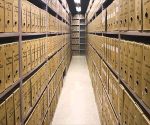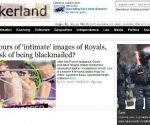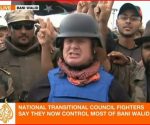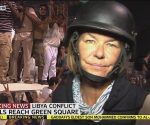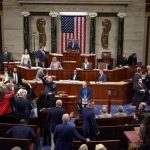Archive: Are the SAS spies or soldiers? And why we should worry about it
First appeared at the Luikkerland website, 7th March 2011
During my research for this article I read a perhaps unkind comment about how Sun readers have an orgasm at the slightest mention of the Army’s Special Air Service. The point being made, one hopes, is the extent of the hero worship that the salt-of-the-earth Briton holds for what is a symbol of British fighting prowess and a projection of his country into the world. And here we have touched on a certain truth in our imaginings of the SAS; we see them pointed outwards on our behalf. But how would we feel if the SAS ever decided that the greatest danger to British interests did not come from outside the country, but from the British people themselves?
The reason all of this occurred to me was because of the reports made on 6th March of the capture of 8 plain clothed SAS men and a junior British diplomat in Benghazi, Libya, by forces opposed to Colonel Gaddafi. The details of the mission these men were on are not clear – as we would expect – but on the on the 4/5th March the Daily Mail online was talking about the possibility of the government putting MI6 people in Libya backed by the SAS, and had some revealing information to impart: “The teams are said to be there ‘primarily’ to gather information. But they will advise the rebels on how to secure a handover of power and set up a democratic government.”
This and the fact that British government ministers have since been calling this captured SAS squad a ‘small diplomatic team’ points to a political dimension in the role of the SAS that possibly exceeds their mandate.
The SAS has been closer organisationally to the Secret Intelligence Service since 1987, and the 22 SAS Regiment, which is as indicated by press reports known to be in the Mediterranean, is otherwise known as the Counter Revolutionary Wing whose role is described as countering the ‘international terrorist problem’.
However, what seems to be going on in Benghazi is more akin to peacetime spying and plotting against a sovereign nation. Granted, the SAS acts covertly to gather information when it is involved in military operations, but this is something completely different that isn’t even to do with anti-terrorist activity.
It is very significant because something completely unsavoury has been happening in the British reaction to events in North Africa and the Middle East, and critics suspect that the British establishment is acting in the interests of its own and the EU’s military-industrial and political complex rather than in the interests of Libyan people fighting for real democracy. Consider the fact that Britain has now sent soldiers/spies to Libya even after Gaddafi has blamed the uprising on outside interference. Any subsequent presence of British armed forces only damages the cause of the rebels – ergo it is self-interested.
It would be of grave concern if there has become established some kind of SAS collaboration in British government international political skulduggery because the British people need to know where the elite arm of its Army stands and what it is prepared to do for a government that has already been shown to be fanatically pro-EU and anti-representative democracy.
It’s especially worrying when you understand that the SAS have been training the demonstrably political British police in the name of security against terrorism, and then as recently as February 2010 a newspaper report revealed plans for the SAS to patrol British streets in the same cause. Both developments were reportedly as a response to the fear of a repeat in Britain of the Mumbai terrorist attacks of November 2008.
However, since 2008 the Mumbai case has become very murky indeed. The attack was automatically blamed upon the (etiological?) Al-Qaeda, but press on the Indian subcontinent were not having it – and there was talk of CIA involvement.
Then in October 2009 a man was arrested in Chicago accused of reconnoitring for possible terrorist targets. David Headley was also accused of organising the Mumbai terror attacks. Yet more surprises were in store as it turned out that Headley was an ex-CIA man. The Times did a story, RT did a piece, and Prison Planet summarised the case in its own indomitable way [RT’s link is the only one surviving: here].
Inevitably it seems we return to something that has become a theme: the Islamist Threat Model [where Muslims are exploited by US/UK government for domestic and geo-political ends] which the Establishment seems to have created itself hand in hand with wide-open immigration rules in order to generate reasons to strip freedoms from British citizens. If we are still doubtful that this is a reality, how do we then rationalise the incongruence between the supposed immediacy and danger of the terror threat, and something like the plans by government to let captured terrorists plea bargain and walk free? Does it indicate that Islamist terrorism is serious? If they are all plotting against us, what sense does it make to let any of them off a prison sentence?
So, even if we are the biggest sceptics in the face of what seem to us to be conspiracy theory – despite a bewildering array of evidence – let us put it aside for one moment and, returning to apply our new knowledge to the scenario under scrutiny, imagine that the CIA really did have something to do with the heinous acts of murder at Mumbai. The first thing we should realise is that the excuse to put crack military units on the streets of Britain is bogus. They would be representing the very thing – the government – that we have the most to fear in the first instance, but imagine how fearful we should be to also know that the SAS is already an integral part of the British government’s dirty tricks campaigns abroad. We would have amongst us dangerous men to whom Counter Revolution meant opposing anybody by subterfuge and by force if necessary who went against the political will of the government.
In my mind the SAS, being soldiers of an Army who (relatively) swear allegiance to the country [in actual fact, the Armed Forces swear allegiance to the Queen and her successors; the Crown rather than a representative civilian government and therefore the common wealth], should not be put in this rather perverse position, and if I were a person in a high place, I would certainly think it high time to seek clarification regarding the role-definitions of our armed forces.




